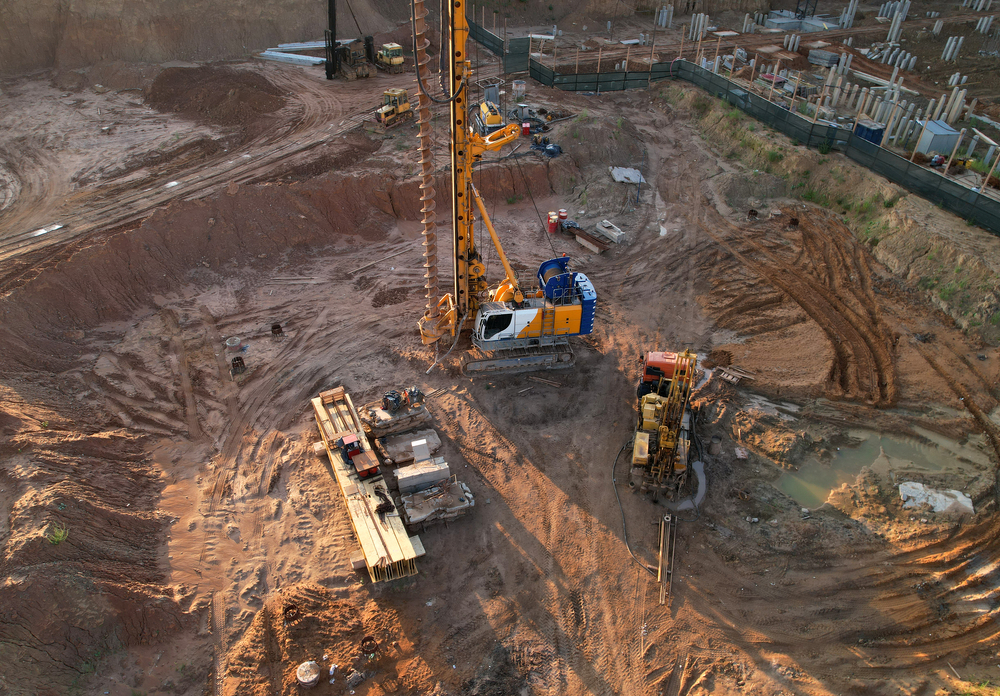Examine This Report on Geotheta
Examine This Report on Geotheta
Blog Article
The Ultimate Guide To Geotheta
Table of ContentsThe Greatest Guide To GeothetaAll about GeothetaNot known Facts About GeothetaGeotheta Things To Know Before You Get ThisAn Unbiased View of Geotheta

They carry out site examinations, accumulate samples, execute lab examinations, and assess information to review the viability of the ground for building jobs - Tailings Engineer. Based upon their findings, geotechnical designers provide recommendations for foundation style, incline stability, keeping frameworks, and reduction of geotechnical hazards. They collaborate with other professionals, such as architects, structural engineers, and building groups, to make sure that geotechnical factors to consider are incorporated right into the general job style and application
By analyzing the actions and homes of soil and rock, they can determine prospective geotechnical hazards such as landslides, soil negotiation, or incline instability. Their knowledge assists prevent failings or accidents that can endanger lives and property. Below are some thorough obligations and duties of a geotechnical engineer: Website Examination: Geotechnical designers conduct site investigations to gather data on subsurface conditions.
They interpret the data to understand the residential or commercial properties and actions of the dirt and rock, including their strength, permeability, compaction characteristics, and groundwater conditions. Geotechnical Evaluation and Layout: Geotechnical engineers evaluate the information gathered during website examinations to examine the stability and viability of the site for construction tasks. They execute geotechnical computations and modeling to examine aspects such as birthing capability, negotiation, incline stability, side earth pressures, and groundwater flow.
What Does Geotheta Mean?
Foundation Design: Geotechnical engineers play a critical function in creating structures that can securely support the designated framework. They examine the soil conditions and tons needs to identify the appropriate foundation type, such as shallow structures (e.g., grounds), deep foundations (e.g (https://geotheta.blog.ss-blog.jp/2024-08-02?1722614750)., heaps), or specialized strategies like soil improvement. They consider factors such as negotiation restrictions, birthing capacity, and soil-structure interaction to develop ideal structure designs
They assess building plans, display site activities, and carry out area examinations to validate that the layout suggestions are complied with. If unpredicted geotechnical issues emerge, they assess the scenario and provide referrals for remediation or modifications to the design. Danger Assessment and Reduction: Geotechnical designers examine geotechnical dangers and dangers connected with the job site, such as landslides, liquefaction, or dirt disintegration.

Partnership and Interaction: Geotechnical engineers function carefully with various other specialists involved in a job, such as architects, structural engineers, and construction groups. Efficient communication and collaboration are necessary to integrate geotechnical considerations into the overall job design and building procedure. Geotechnical designers provide technical expertise, response inquiries, and guarantee that geotechnical needs are met.
The Facts About Geotheta Uncovered
Right here are some kinds of geotechnical designers: Foundation Designer: Structure engineers specialize in making and examining structures for structures. They examine the dirt problems, lots needs, and website attributes to determine one of the most ideal foundation kind and layout, such as shallow foundations, deep structures, or specialized strategies like stack foundations.
They examine the factors influencing slope security, such as soil homes, groundwater conditions, and slope geometry, and establish techniques to prevent incline failings and minimize threats. Quake Designer: Earthquake engineers concentrate on evaluating and making frameworks to stand up to seismic pressures. They evaluate the seismic risk of a site, assess dirt liquefaction potential, and develop seismic layout requirements to make certain the safety and durability of structures throughout earthquakes.
They execute area testing, collect examples, and analyze the collected information to characterize the dirt buildings, geologic developments, and groundwater problems at a site. Geotechnical Instrumentation Engineer: Geotechnical instrumentation designers concentrate on monitoring and gauging the behavior of dirt, rock, and frameworks. They set up and keep instrumentation systems that check factors such as dirt settlement, groundwater levels, incline activities, and architectural displacements to analyze efficiency and offer early cautions of prospective problems.
Not known Facts About Geotheta
They conduct tests such as triaxial examinations, consolidation examinations, direct shear tests, and permeability useful link examinations to collect data for geotechnical analysis and layout. Geosynthetics Engineer: Geosynthetics designers concentrate on the layout and application of geosynthetic products, such as geotextiles, geogrids, and geomembranes. They make use of these products to enhance soil stability, enhance slopes, provide drain services, and control disintegration.
They often tend to be investigative individuals, which implies they're intellectual, reflective, and investigative. They are interested, systematic, rational, analytical, and sensible. Some of them are also social, meaning they're kind, charitable, participating, person, caring, helpful, empathetic, sensible, and pleasant - Geo Tech Engineer.
In the workplace atmosphere, geotechnical designers use specialized software application tools to carry out computations, create designs, and assess information. They prepare reports, review task requirements, interact with clients and employee, and coordinate task activities. The office setup supplies a favorable atmosphere for research, evaluation, and partnership with other professionals associated with the job.
See This Report on Geotheta
They regularly check out project sites to perform website investigations, assess geotechnical problems, and collect data for evaluation. These gos to entail taking a trip to different areas, sometimes in remote or difficult surfaces. Geotechnical engineers may execute soil tasting, conduct examinations, and monitor building tasks to ensure that the geotechnical elements of the task are being executed properly.
Geotechnical engineers also work in specialized geotechnical labs. Geotechnical lab designers work extensively in these atmospheres, managing testing devices, operating instruments, and taping information.
Report this page